
248.4K
Downloads
595
Episodes
Subscribe to the OMFIF podcast for the latest news and insight on financial markets, monetary policy and global investment themes. Published weekly, the podcast features input from a range of academic experts, central bankers and investment professionals. Visit our website at www.omfif.org.
Subscribe to the OMFIF podcast for the latest news and insight on financial markets, monetary policy and global investment themes. Published weekly, the podcast features input from a range of academic experts, central bankers and investment professionals. Visit our website at www.omfif.org.
Episodes
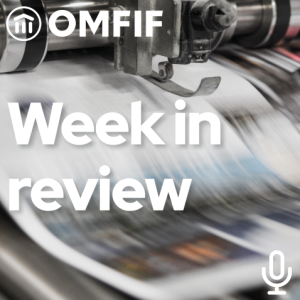
Friday Jun 19, 2020
Week in review: Diversity in central banking, fiscal wrangling, and more
Friday Jun 19, 2020
Friday Jun 19, 2020
OMFIF’s Julie Levy-Abegnoli looks back over some of the most recent articles published on the OMFIF website, including those on diversity in central banking, US fiscal wrangling, and ECB bond purchases.
Articles and other items referenced:
- US fiscal wrangling in full force: https://www.omfif.org/2020/06/us-fiscal-wrangling-in-full-force/
- Central banks' diversity problem: https://www.omfif.org/2020/06/central-banks-diversity-problem/
- Fresh German legal battle over ECB easing: https://www.omfif.org/2020/06/fresh-german-legal-battle-over-ecb-easing/
- Six centuries of central bank independence (synopsis): https://www.omfif.org/2020/06/six-centuries-of-central-bank-independence/
- Central banking before 1800 (book review): https://www.omfif.org/2020/06/central-banking-before-1800/
- Digital Monetary Institute Journal, June edition: https://www.omfif.org/omfif-digital-monetary-institute-journal-upgrading-the-network/
- The bumpy road to recovery: https://www.omfif.org/events/the-bumpy-road-to-recovery/
- Cybersecurity post-pandemic: https://www.omfif.org/events/cybersecurity-post-pandemic/
- Financial services in the new age of work: https://www.omfif.org/events/financial-services-in-the-new-age-of-work/
- The US in the global order: https://www.omfif.org/events/the-us-in-the-global-order-the-role-of-the-dollar-and-tensions-with-china/
- Covid-19 responses and recovery - Perspectives from Germany: https://www.omfif.org/events/covid-19-response-and-recovery-perspective-from-germany/
Music: Hey Mercy by Pierce Murphy is licensed under an Attribution License.
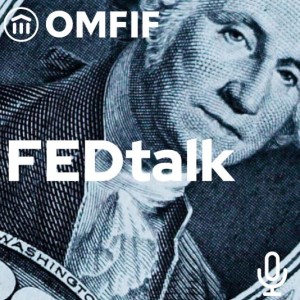
Friday Jun 12, 2020
Fed talk: The US’s ‘long road’ to recovery
Friday Jun 12, 2020
Friday Jun 12, 2020
Jerome Powell, chairman of the US Federal Reserve, laid out the central bank’s stance on inflation, job growth and plans to support the economy in mid-June. Tim Duy, professor of practice and senior director of the Oregon Economic Forum at the University of Oregon, joins Mark Sobel, US chairman of OMFIF, to discuss the Federal Reserve’s policies for job growth and the announcement that interest rates will remain near zero till 2022.
Music: https://www.bensound.com/royalty-free-music

Friday Jun 12, 2020
Friday Jun 12, 2020
OMFIF’s Julie Levy-Abegnoli looks back over some of the most recent articles published on the OMFIF website, including those on the confusing debate on negative interest rates, US corporations' bond purchases, and the Germany-ECB dispute.
Articles and other items referenced:
- Negative interest rate debate needs clarity: https://www.omfif.org/2020/06/negative-interest-rate-debate-needs-clarity/
- US corporations' bond market clout: https://www.omfif.org/2020/06/us-corporations-bond-market-clout/
- Solution nears on ECB bond buying: https://www.omfif.org/2020/06/solution-nears-on-ecb-bond-buying/
- The future of the workplace – Resilience and adaptation to technological disruption: https://www.omfif.org/podcast/the-future-of-the-workplace-resilience-and-adaptation-to-technological-disruption/
- The OMFIF-KPMG series – Future of infrastructure as an asset class: https://www.omfif.org/podcast/the-omfif-kpmg-series-future-of-infrastructure-as-an-asset-class/
- Accelerating ESG investment through sustainable data: https://www.omfif.org/events/the-future-of-esg-investment-accelerating-the-agenda-through-sustainable-data/
- Demystifying government deficits and central bank financing: https://www.omfif.org/events/demystifying-government-deficits-and-central-bank-financing/
- Sustainable investment in the post-pandemic economy: https://www.omfif.org/events/sustainable-investment-in-the-post-pandemic-economy/
Music: Hey Mercy by Pierce Murphy is licensed under an Attribution License.
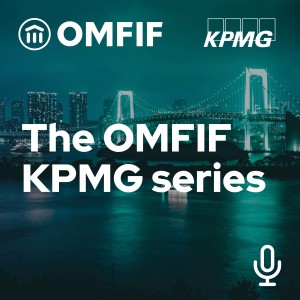
Wednesday Jun 10, 2020
The OMFIF/KPMG series: Future of infrastructure as an asset class
Wednesday Jun 10, 2020
Wednesday Jun 10, 2020
In the first edition of the OMFIF-KPMG Asia Pacific podcast series, Jang Ping Thia, principal economist at the Asian Infrastructure Investment Bank, joins KPMG's Sharad Somani and OMFIF's Adam Cotter to discuss the future of infrastructure as an asset class. What can be done to ensure funding for infrastructure projects? Is the pandemic accelerating the adoption of technology to improve project delivery? Are governments implementing reforms quickly enough to support sustainable infrastructure projects? Does the Covid-19 crisis offer a golden opportunity for policy-makers to build a clear pipeline of greenfield and brownfield projects in emerging markets?
Music: https://www.bensound.com/royalty-free-music
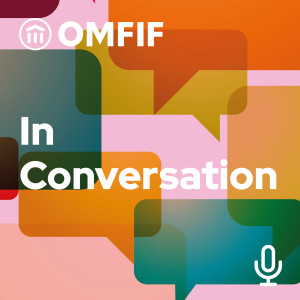
Monday Jun 08, 2020
Monday Jun 08, 2020
Technological innovation has been a driver of productivity and economic growth throughout history. Yet, it has also stoked fears of labour displacement and job redundancy. Society is grappling with those uncertainties today as adaptation to Covid-19 accelerates advances in automation, artificial intelligence and digitalisation in the workplace. Deanna Ong, chief people officer of GIC, joins OMFIF’s Brandon Chye to discuss how employees and organisations can develop human capital and leadership to harness the benefits of technology and to blunt its disruptions.
Music: https://www.bensound.com/royalty-free-music

Friday Jun 05, 2020
Friday Jun 05, 2020
OMFIF’s Julie Levy-Abegnoli looks back over some of the most recent articles published on the OMFIF website, including those on the European Commission's recovery plan, Argentina's debt negotiations, and Japan's stimulus package.
Articles and other items referenced:
- Preventing Europe's 'Great Fragmentation': https://www.omfif.org/2020/06/preventing-europes-great-fragmentation/
- Argentina and creditors enter new round: https://www.omfif.org/2020/06/argentina-and-creditors-enter-new-round/
- Asia Pacific regional economic outlook: https://www.omfif.org/podcast/asia-pacific-regional-economic-outlook/
- Financing Japan's record stimulus: https://www.omfif.org/2020/06/financing-japans-record-stimulus/
- Demystifying Brexit negotiations: https://www.omfif.org/events/demystifying-brexit-negotiations/
- The future for asset owners: https://www.omfif.org/events/the-future-for-asset-owners/
Music: Hey Mercy by Pierce Murphy is licensed under an Attribution License.
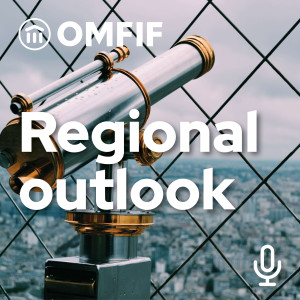
Tuesday Jun 02, 2020
Asia Pacific regional economic outlook
Tuesday Jun 02, 2020
Tuesday Jun 02, 2020
Growth in Asia, hit by the Covid-19 pandemic, is forecast to be zero in 2020. Prospects for 2021 are uncertain, though strong growth is expected. Changyong Rhee, director of the International Monetary Fund’s Asia and Pacific department, joins Mark Sobel, US chairman of OMFIF, to discuss the impact of coronavirus on the region, actions taken by policy-makers, and the post-pandemic outlook for Asia Pacific.
Music: https://www.bensound.com/royalty-free-music

Friday May 29, 2020
Friday May 29, 2020
OMFIF's Julie Levy-Abegnoli looks back over some of the most recent articles published on the OMFIF website, including those on negative interest rates, Chinese banks' cross-border activities, and decadent Brexit.
Articles and other items referenced:
- UK negative rates could do more harm than good: https://www.omfif.org/2020/05/uk-negative-rates-could-do-more-harm-than-good/
- Chinese banks' global footprints: https://www.omfif.org/2020/05/chinese-banks-global-footprints/
- Covid-19 and the 'decadent Brexit' hypothesis: https://www.omfif.org/2020/05/covid-19-and-the-decadent-brexit-hypothesis/
- Worldwide insurance heading for shake-up: https://www.omfif.org/2020/05/worldwide-insurance-heading-for-shake-up/
- European response to Covid-19: https://www.omfif.org/podcast/european-response-to-covid-19/
- Implications of monetary and fiscal policies on investment markets: https://www.omfif.org/events/implications-of-monetary-and-fiscal-policies-on-investment-markets/
- Economic and financial trends in Latin America: https://www.omfif.org/events/economic-and-financial-trends-in-latin-america/
- Markets and their supervision in times of Covid-19: https://www.omfif.org/events/market-participation-and-supervision-in-times-of-covid-19/
- Overcoming debt crisis in emerging markets: https://www.omfif.org/events/overcoming-debt-crisis-in-emerging-markets-prospects-for-sovereign-debt-restructuring-and-access-to-financing/
Music: Hey Mercy by Pierce Murphy is licensed under an Attribution License.
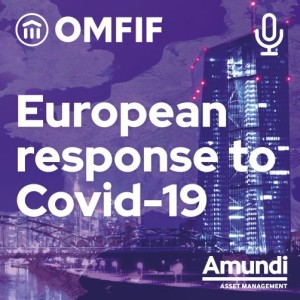
Wednesday May 27, 2020
European response to Covid-19
Wednesday May 27, 2020
Wednesday May 27, 2020
The European Central Bank at the next monetary policy meeting on 4 June is expected to increase its pandemic emergency bond-buying programme by €400bn- €500bn, after having spent around €250bn of the €750 bn total up to end-May. That is the forecast of Didier Borowski, head of global views at French asset manager Amundi, in a podcast with OMFIF on the options facing the ECB after the ruling on bond purchases by the German constitutional court on 5 May. ‘If you look ahead, and seeing the debate in Germany, [the ECB] may lose some flexibility in its purchase programme,’ Borowski said. ‘In the short run, we would expect the ECB in its government bond purchases to continue to deviate quite substantially from the capital key.
Music: https://www.bensound.com/royalty-free-music

Tuesday May 26, 2020
Worldwide insurance heading for shake-up
Tuesday May 26, 2020
Tuesday May 26, 2020
David Marsh is joined by Simon Woods, EY’s global response leader for the Covid-19 repercussions on the insurance industry. They discuss the pandemic’s effect on the global insurance industry, including the immediate and longer-term consequences for operations and technology, looking at the challenges and opportunities brought by digitalisation. They examine the financial health of the insurance sector as a result of the volatility in financial markets and the recession, and what can be said of the significant strain on capital, liquidity, and investment strategies. They address big questions on how the insurance industry can work with customers, governments and regulators in contributing to the wider economic recovery and investigate the outlook for innovation, and worldwide insurance consolidation.
Simon Woods is the leader for insurance strategy for the Europe, Middle East, India and Africa region and a veteran of the sector, having been at EY since 2014, and in the 15 years before that before that covering insurance in various investment banking positions.
Music: https://www.bensound.com/royalty-free-music


